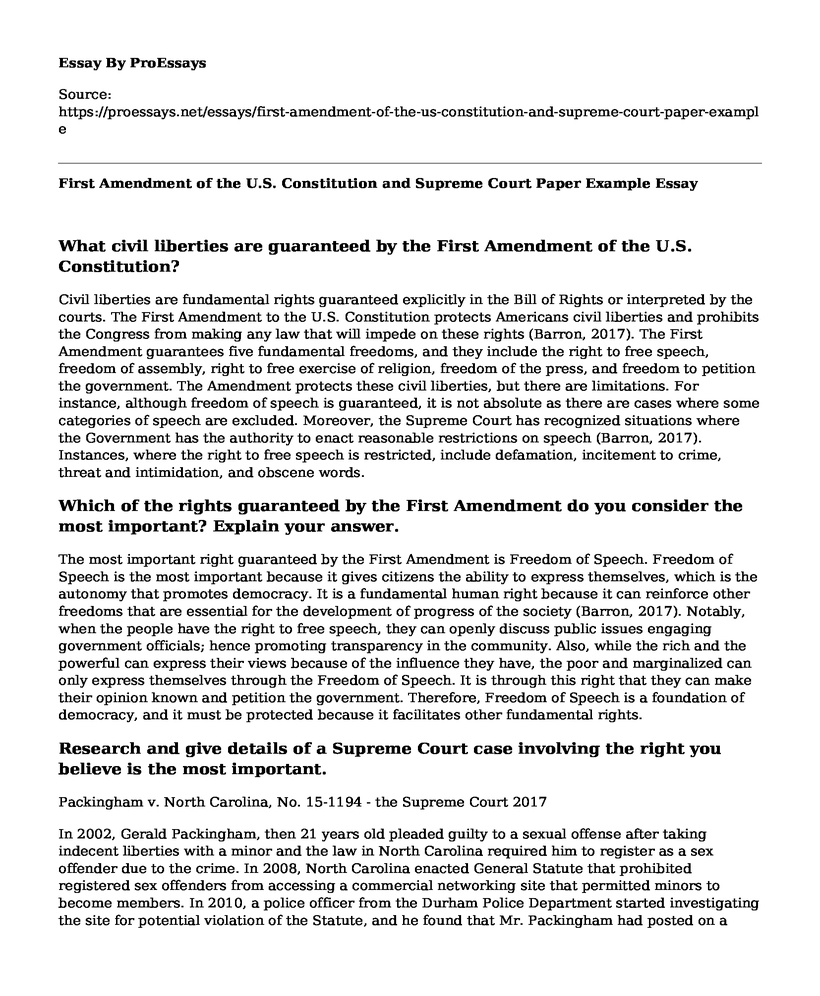What civil liberties are guaranteed by the First Amendment of the U.S. Constitution?
Civil liberties are fundamental rights guaranteed explicitly in the Bill of Rights or interpreted by the courts. The First Amendment to the U.S. Constitution protects Americans civil liberties and prohibits the Congress from making any law that will impede on these rights (Barron, 2017). The First Amendment guarantees five fundamental freedoms, and they include the right to free speech, freedom of assembly, right to free exercise of religion, freedom of the press, and freedom to petition the government. The Amendment protects these civil liberties, but there are limitations. For instance, although freedom of speech is guaranteed, it is not absolute as there are cases where some categories of speech are excluded. Moreover, the Supreme Court has recognized situations where the Government has the authority to enact reasonable restrictions on speech (Barron, 2017). Instances, where the right to free speech is restricted, include defamation, incitement to crime, threat and intimidation, and obscene words.
Which of the rights guaranteed by the First Amendment do you consider the most important? Explain your answer.
The most important right guaranteed by the First Amendment is Freedom of Speech. Freedom of Speech is the most important because it gives citizens the ability to express themselves, which is the autonomy that promotes democracy. It is a fundamental human right because it can reinforce other freedoms that are essential for the development of progress of the society (Barron, 2017). Notably, when the people have the right to free speech, they can openly discuss public issues engaging government officials; hence promoting transparency in the community. Also, while the rich and the powerful can express their views because of the influence they have, the poor and marginalized can only express themselves through the Freedom of Speech. It is through this right that they can make their opinion known and petition the government. Therefore, Freedom of Speech is a foundation of democracy, and it must be protected because it facilitates other fundamental rights.
Research and give details of a Supreme Court case involving the right you believe is the most important.
Packingham v. North Carolina, No. 15-1194 - the Supreme Court 2017
In 2002, Gerald Packingham, then 21 years old pleaded guilty to a sexual offense after taking indecent liberties with a minor and the law in North Carolina required him to register as a sex offender due to the crime. In 2008, North Carolina enacted General Statute that prohibited registered sex offenders from accessing a commercial networking site that permitted minors to become members. In 2010, a police officer from the Durham Police Department started investigating the site for potential violation of the Statute, and he found that Mr. Packingham had posted on a social networking site. Mr. Packingham was arrested and convicted for violating the statute, and although he argued at the trial that the conviction was a violation of the First Amendment, the Court denied him a motion to dismiss the charges (Burnette-McGrath, 2018). Mr. Packingham appealed the case, and the Court of Appeals struck down the Statute. The decision of the Court of Appeals was reversed at the North Carolina Supreme Court, and it was argued that the Statute was constitutional. The plaintiff appealed to the Supreme Court of the United States.
How did the Supreme Court rule in that case?
The Supreme Court ruled that the Statute was unconstitutional because it contravened the First Amendment. In its decision, the Supreme Court pointed out that the First Amendment guarantees civil liberties such as the right to free speech and that citizens had access to places where they could express their views, and the social networking site is one of them (Burnette-McGrath, 2018). The Court also recognized that the internet was a platform for criminal activities. However, the Supreme Court concluded that the Statute was overly broad; hence contravening the First Amendment.
References
Barron, J. (2017). First amendment law in a nutshell. West Academic.
Burnette-McGrath, M. (2018). Packingham v. North Carolina 137 S. Ct. 1730 (2017). Ohio NUL Rev., 44, 117.
Cite this page
First Amendment of the U.S. Constitution and Supreme Court Paper Example. (2022, Sep 07). Retrieved from https://proessays.net/essays/first-amendment-of-the-us-constitution-and-supreme-court-paper-example
If you are the original author of this essay and no longer wish to have it published on the ProEssays website, please click below to request its removal:
- Politics: Yesterday, Today and Tomorrow Essay Example
- Essay Sample on Curriculum Relevance in Multicultural Societies: Standardizing Knowledge
- Essay Sample on DACA Shutdown: Impact on Undocumented Immigrants in US
- Essay Example on IT Governance: A Necessity for Effective Business Strategies
- Paper Example on Good Governance and Democratic Legitimacy: Definition and Application
- Policy Creation: A Critical Concept for Public Health - Essay Sample
- Crime Statistics of 5 Major Cities - Report Example







